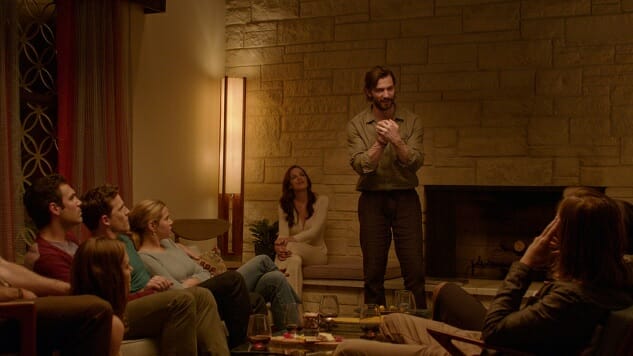The Invitation

The less you know about Karyn Kusama’s The Invitation, the better. This is true of slow-burn cinema of any stripe, but the difference between Kusama’s film and, say, The House of the Devil is that Kusama’s film is good. She slow-burns to perfection. The key, it seems, to successful slow-burning in narrative fiction is the narrative rather than the actual slow-burn. In the case of The Invitation, that involves a tale of deep and intimate heartache, the kind that none of us hopes to ever have to endure in our own lives. The film taps into a nightmare vein of real-life dread, of loss so profound and pervasive that it fundamentally changes who you are as a human being. That’s where we begin: with an examination of grief.
Where we end is obviously best left unsaid, but endings are generally never an appropriate topic in a review format. Besides, The Invitation is remarkable neither for its ending nor for the direction we take to arrive at its ending. Instead, it is remarkable for its foundation, for all of the substantive storytelling infrastructure that Kusama builds the film upon in the first place. Anybody can crank their movie’s dramatic thermostat past 68 and make the audience sweat in its final 15 minutes. It takes a far more gifted filmmaker to encourage perspiration within the first five instead. If The Invitation’s basic setup makes it sound as though it’s cut from the same well-tread cloth of the most precious indie cinema, consider that a blessing: It means you have less than no idea what Kusama has in store for you.
The film starts in earnest as Will (Logan Marshall-Green in top form) arrives at a dinner party his ex-wife, Eden (Tammy Blanchard), is throwing at what once was their house. He has brought his girlfriend, Kira (Emayatzy Corinealdi), along with him, though you get the sense he’s really going along with her. What guy actively wants to hang out with his ex-wife and her new spouse? That sounds like a stairway descending through just about every major circle of Hell. But Will is dedicated to attending, if only in the pursuit of getting some unspecified catharsis out of the encounter. If there’s a silver lining here aside from Kira, it’s that his friends will all be there, too—Gina (Michelle Krusiec), Ben (Jay Larson), Tommy (Mike Doyle), Claire (Marieh Delfino), Miguel (Jordi Vilasuso). Seems like a safe-enough space.
But of course it isn’t. “Safe” might even be a strong word. Something is undeniably off at Eden’s place, and because Will is the lens through which Kusama’s audience engages with the film, we cannot tell whether that something is Will or if it’s Eden, or if it’s her husband, David (Michiel Huisman), or if it’s their two chums, Pruitt (John Carroll Lynch) and Sadie (Lindsay Burge). Everyone else seems fine and dandy, if occasionally perturbed or put off by weird overtures and reflections David makes to his assembled guests. It is Will who is most on edge at his surroundings and his hosts. To the eyes of all gathered, he reads simply as a man who has inserted himself into an uncomfortable situation he isn’t ready to handle. We, on the other hand, know better, or at least we think we do.